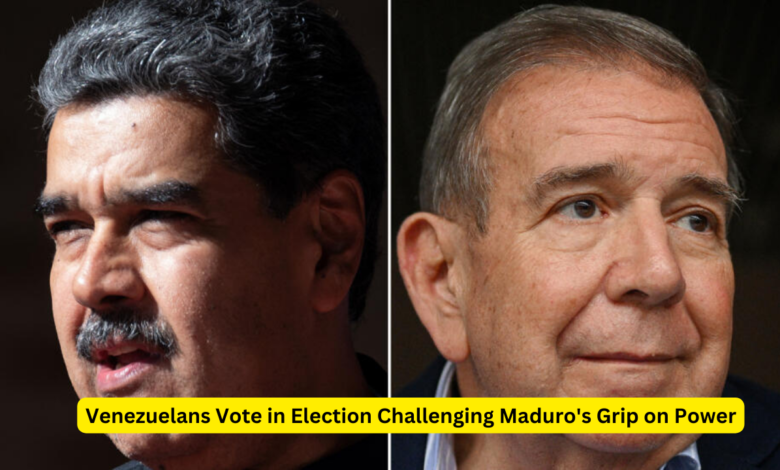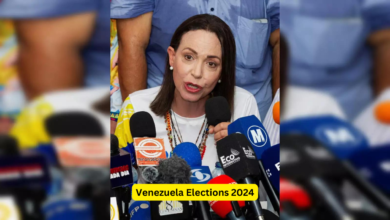Venezuelans Vote in Election Challenging Maduro’s Grip on Power

In a historic moment for Venezuela, the nation’s citizens are casting their ballots in an election that has the potential to redefine the country’s political landscape. This election marks a significant challenge to President Nicolás Maduro’s hold on power, amidst a backdrop of economic turmoil, social unrest, and international scrutiny.
Background of the Venezuelan Crisis
Venezuela, once one of the wealthiest countries in Latin America, has been grappling with a severe economic crisis for years. The country’s economy has been crippled by hyperinflation, food and medicine shortages, and a significant drop in oil production, which is the backbone of its economy. The political landscape has been equally tumultuous, with President Nicolás Maduro and his predecessor, Hugo Chávez, implementing policies that have led to international sanctions and widespread domestic opposition.
The Electoral Context
This election is seen as a critical juncture for Venezuela. It follows years of protests, failed negotiations, and a deeply divided society. The opposition, which has often been fragmented and struggling to gain a unified front, has rallied behind a single candidate this time, hoping to consolidate their support base. The stakes are high, as the outcome will determine whether Venezuela continues on its current path or embarks on a new direction.
Challenges to Maduro’s Leadership
Economic Mismanagement and Corruption: Under Maduro’s administration, the mismanagement of the economy has been a significant point of contention. The government’s control over key industries and the implementation of strict price controls have led to widespread shortages and economic stagnation. Corruption has also been rampant, with allegations of embezzlement and fraud further eroding public trust in the government.
Humanitarian Crisis: The ongoing humanitarian crisis has seen millions of Venezuelans flee the country in search of better living conditions. Those who remain face dire circumstances, with access to basic necessities becoming increasingly difficult. The government’s failure to address these issues has fueled discontent and demands for change.
International Isolation: Maduro’s government has faced international isolation, with many countries and organizations refusing to recognize his presidency. Sanctions imposed by the United States and the European Union have further strained the country’s economy and increased pressure on the regime.
The Opposition’s Strategy
The opposition’s strategy in this election has been to present a united front, focusing on issues that resonate with the general populace. Their campaign has centered around promises to restore economic stability, fight corruption, and address the humanitarian crisis. By rallying behind a single candidate, the opposition hopes to maximize their chances of unseating Maduro and initiating meaningful change.
Voter Sentiment and Turnout
Voter sentiment is a critical factor in this election. Many Venezuelans are disillusioned with the current state of affairs and are eager for change. However, there is also a significant amount of skepticism about the electoral process itself, given past allegations of fraud and manipulation. Ensuring a high voter turnout is essential for the opposition, as a low turnout could favor Maduro, who has a loyal base of supporters.
The Role of International Observers
International observers play a crucial role in this election. Their presence is meant to ensure transparency and fairness in the electoral process. However, there have been concerns about the extent of their access and the ability of the government to manipulate outcomes. The credibility of the election results will largely depend on the reports from these observers and the international community’s response.
Potential Outcomes and Implications
The potential outcomes of this election are varied and complex. If the opposition manages to secure a victory, it could pave the way for significant political and economic reforms. However, a victory for Maduro would likely result in continued unrest and further international isolation. The implications of this election extend beyond Venezuela’s borders, as regional stability and international relations are closely tied to the country’s political situation.
Reform and Reconciliation: A victory for the opposition could initiate a period of reform and reconciliation. Addressing the humanitarian crisis, restoring economic stability, and rebuilding international relationships would be top priorities. This path would require significant effort and international support but could ultimately lead to a brighter future for Venezuela.
Continued Crisis: On the other hand, if Maduro retains power, the current crises are likely to persist. Continued economic decline, social unrest, and international isolation would further deteriorate the quality of life for Venezuelans. The opposition would need to regroup and reconsider their strategies for effecting change.
Conclusion
The Venezuelan election represents a pivotal moment in the country’s history. The stakes are incredibly high, and the outcome will have far-reaching consequences for Venezuela and beyond. As the nation votes, the international community watches closely, hoping for a peaceful and democratic resolution to the ongoing crisis.



